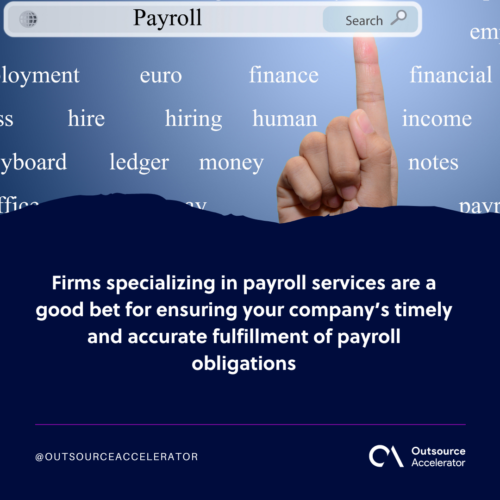3 Types of payroll systems: What’s the difference?

- Types of payroll systems: similarities and differences
In a conventional setup, payroll processing is typically done in-house.
This works in two disparate cases: bigger companies that streamline the payroll across all departments or small companies with a local staff numbering less than ten employees, with few variations to weekly work hours or wages.
In the latter case, it is practical to process payroll in-house with payroll software; the employee designated to do payroll will be responsible for keeping accounts, staying up to date with payroll tax laws, and safeguarding the company’s relevant financial data.
But if this is not the case for your company, and you anticipate for your bookkeeping needs to grow a little more complex over time, what are your alternatives to doing the payroll processing in-house?
3 types of payroll systems
Here are three types of payroll systems that you can consider outsourcing.
1. Bookkeepers and CPAs
It is possible to commission the services of individual bookkeepers or CPAs to handle payroll and tax records.
When taking on an independent contractor, it is important to look for a professional with expertise and flexibility whom you can trust to help you accurately deposit and pay for your respective area’s federal tax liabilities. Payment will still be made in your company’s name.

2. Payroll services
Firms that include specialization in payroll services, like ConnectOS, are a good bet for ensuring your company’s timely and accurate fulfillment of payroll obligations. They typically offer necessary administrative services such as direct bank deposits and automatic deductions from paychecks.
Some payroll services are also already aware of the US Department of Treasury’s Electronic Federal Tax Payment System (EFTPS) and may offer electronic filing on your company’s behalf.
By incorporating this feature into their offerings, these services streamline the processing of payroll and tax obligations for businesses. Moreover, a professionally managed payroll system can handle the complexities of tax compliance, reducing employers’ burden.
Businesses can benefit from leveraging a payroll service that not only facilitates payroll processes but also integrates with government tax systems for seamless tax filing.
With an employee payroll system that includes electronic tax filing capabilities, companies can ensure accuracy and timeliness in meeting their tax obligations.

3. Online payroll
This model is a particular boon to SMEs. In addition to tax filing services and administrative services, online payroll companies typically allow 24/7 access and monitoring of payroll details through a secure browser without any additional cost for software and/or equipment.
With the best payroll software, businesses can streamline their payroll process efficiently. The online payroll management system enables easy access to payroll data, facilitating quick retrieval and analysis.
Through the online payroll system, it will be easy to do some of the basic payroll operations and search for and update details on employee records such as sick leaves, vacation days, and respective deductions.







 Independent
Independent




